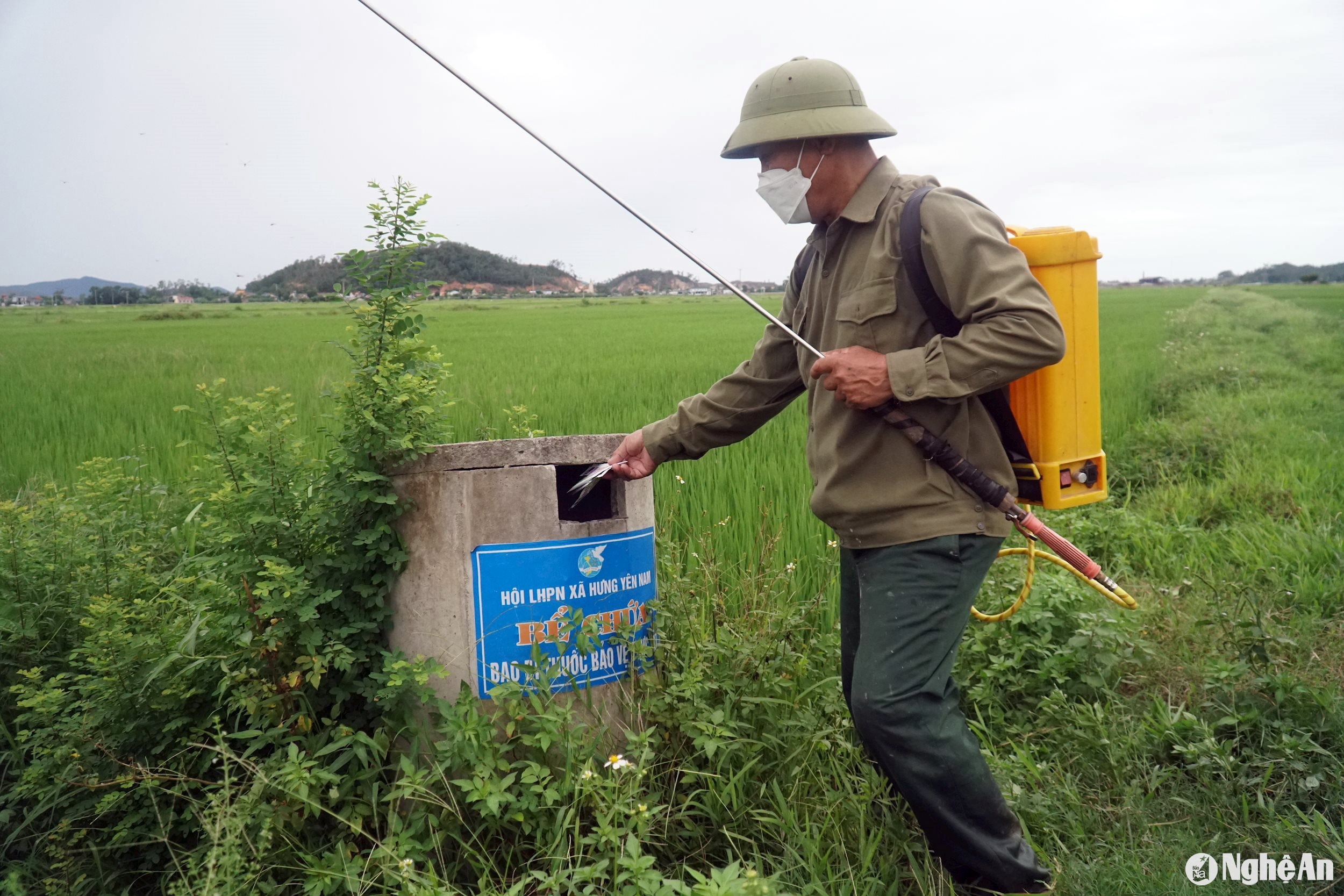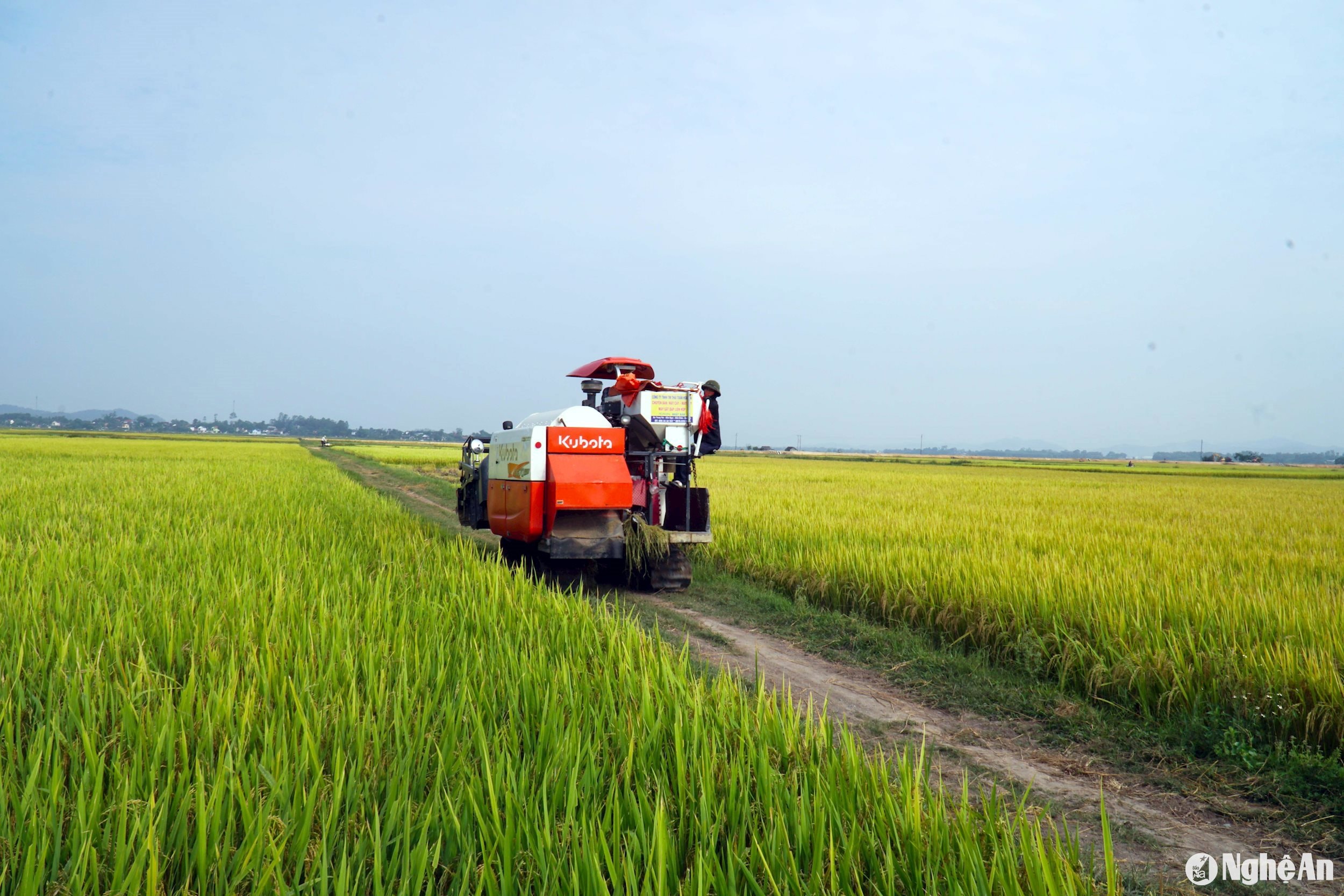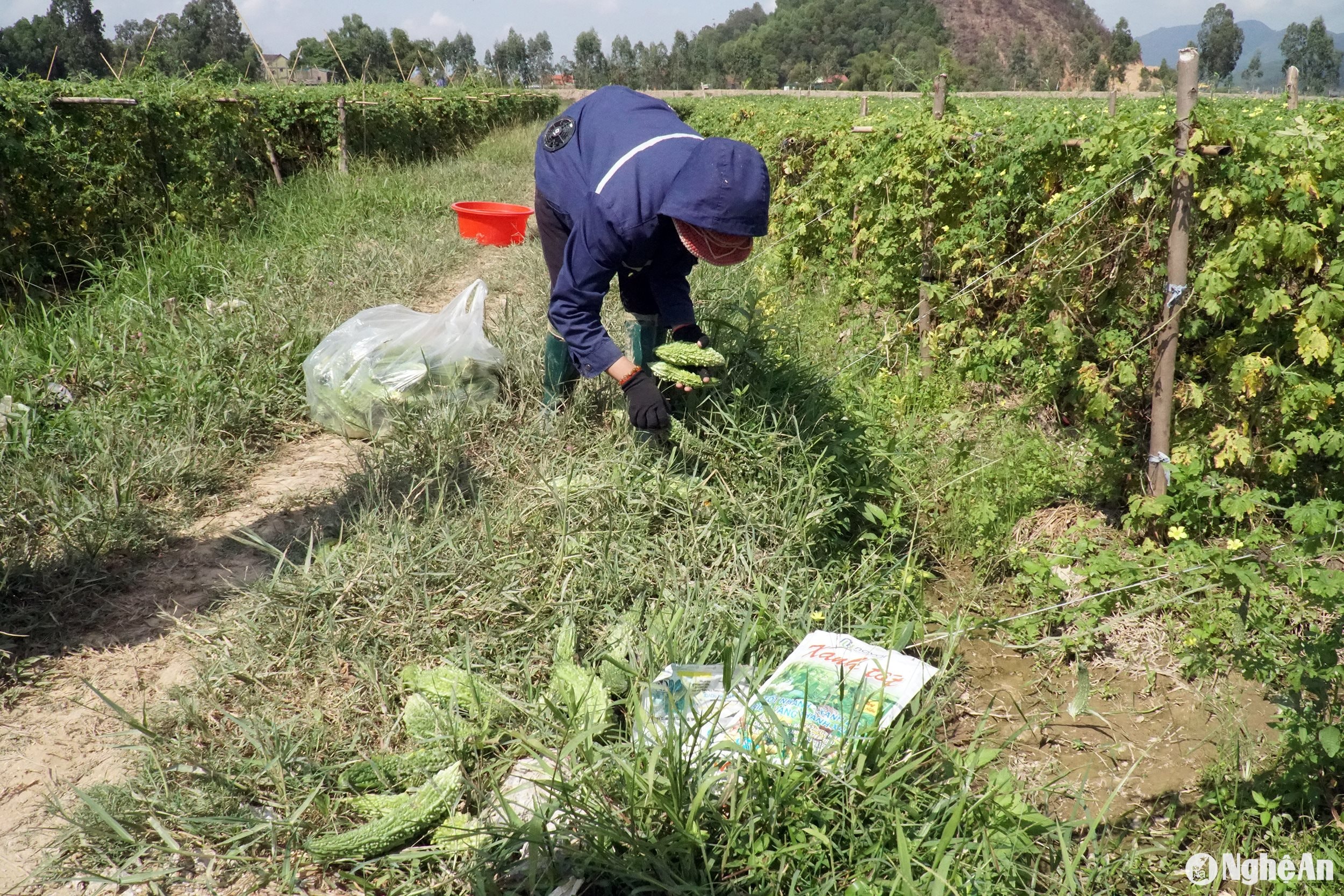Fields gradually cleared of pesticide waste in Nghe An
Along with the efforts to invest in building a tank system, Nghe An has also stepped up propaganda and handling of violations in the collection of plant protection waste. The situation of packaging and bottles of pesticides being thrown haphazardly in the fields has significantly reduced.
Garbage collection
Her family has 3 sao of rice and often has to use pesticides. Not only does she collect her own waste, but when she goes to the fields, Ms. Nguyen Thi Hai in Dien Nguyen commune, Dien Chau district also takes the opportunity to pick up each packaging and bottle containing used pesticides from others, collect them, and bring them to the nearby waste tank.
Before, when there was no tank, people accepted to throw it away with household waste, even throwing it on the edge of the field. But now that there is a tank, the commune regularly propagates and clearly explains the harmful effects of packaging and bottles of chemicals, so not putting them in the tank makes me feel guilty. In the fields, sometimes people still leave them after spraying, so if I see them, I collect them and put them in a centralized tank, reducing environmental impact as well as cleaning and beautifying the fields."
Mrs. Nguyen Thi Hai - Dien Nguyen commune, Dien Chau district
In 2019, with the support of the Program "Building a system of tanks to collect and treat packaging and bottles of plant protection drugs after use in the fields, and educating people about the harmful effects of pesticide residues on humans and the community", Dien Chau district built 850 tanks to collect and treat packaging and bottles of plant protection drugs after use in the fields in 10 communes: Dien An, Dien Hai, Dien Hoa, Dien Hong, Dien Nguyen, Dien Phuc, Dien Thai, Dien Thap, Dien Tho and Dien Truong.
With a total rice production area of 2,827 hectares, the demand for tanks in these communes is 942 tanks. Previously, there were 49 tanks in the area, plus the number of tanks supported for construction in 2023, these 10 communes only lack 43 tanks.

Mr. Le The Hieu - Head of the Department of Agriculture and Rural Development of Dien Chau district said: In previous years, with the efforts of the people and localities, by the end of 2018, Dien Chau district had equipped 2,647 tanks. After receiving support, in the rice growing areas of the district, the requirements according to regulations have basically been met, creating favorable conditions for the district to direct the communes to focus on propaganda to raise awareness, consciousness and responsibility of the people, significantly overcoming the situation of littering in the fields in Dien Chau district.
Do Luong district has an area of over 12,000 hectares of annual crops, of which 8,972 hectares are not flooded. According to Mr. Nguyen Kim Ngoc - Deputy Director of the District Agricultural Service Center: Up to now, the area has been supported to build 1,428 tanks, and communes have also invested in installing more. However, not only the number of existing tanks does not meet the requirements, but in general, people's awareness in the issue of collection is still limited, even in areas where tanks have been installed, pesticide waste is still thrown indiscriminately by people out of habit.
Faced with that situation, Do Luong district has directed communes to focus on promoting propaganda, implementation, and integration into neighborhood meetings, women's association meetings, etc. Most of the tanks are located on main traffic routes, convenient for travel, ensuring appropriate distances for convenient waste collection. Some communes have also stepped up inspections and reminders of violations by people.

Thanks to the efforts of synchronous solutions, the situation of indiscriminately dumping used pesticide packaging and bottles in Do Luong district has decreased significantly. Ms. Nguyen Thi Thuan in Hoa Son commune shared: Not only are they reminded on loudspeakers and in neighborhood meetings, but the people who produce in the fields also remind each other if they see violations. Therefore, many times, even when in a hurry, they have to collect all bottles and packaging and put them in the tank instead of daring to throw them on the shore like before.
Coordinate and promote propaganda
Nghe An has an annual planting area of over 300 thousand hectares of various crops, each year the amount of pesticides used is up to 300-400 tons, corresponding to 25-30 tons of packaging and bottles of various types of pesticides being discarded. For many years, the situation of packaging and bottles of pesticides after use being left on the banks of fields and ditches has been a common reality, posing a potential risk of food safety and hygiene, adversely affecting human health and polluting the environment.
From 2017 to present, implementing the Program "Building a system of tanks to collect and treat packaging and bottles of plant protection drugs after use in the fields, and educating people about the harmful effects of pesticide residues on humans and the community", Nghe An has supported the construction of nearly 7,000 tanks to collect this extremely dangerous waste in the districts of Yen Thanh, Anh Son, Do Luong, Thanh Chuong, Dien Chau...
To be able to promote the effectiveness of the system of tanks for storing packaging and bottles of plant protection drugs after use, the awareness of the producers - the people who directly use the drugs - is one of the first and decisive conditions and requirements.
Mr. Nguyen Tien Duc - Head of the Provincial Department of Cultivation and Plant Protection.
Therefore, along with investment in construction, the issue of propaganda to contribute to changing people's awareness is also the content that the Provincial Department of Cultivation and Plant Protection has focused on implementing for many years, in order to contribute to raising awareness and responsibility, gradually changing the habit of indiscriminately throwing away pesticide packaging and bottles in the fields.

Mr. Nguyen Tien Duc - Head of the Provincial Department of Crop Production and Plant Protection said: We coordinate with the People's Committees of communes to organize conferences and propagate on the commune's loudspeaker system; at the same time, coordinate with press agencies to create reports and write articles to propagate to farmers about the harmful effects of pesticide residues on people and the community. Some localities such as Yen Thanh district also assign responsibility to communes and hamlets in handling cases of intentional failure to collect in accordance with the provisions of the Environmental Law.
Because they are mainly made of nylon and plastic bottles, pesticide packaging and bottles are very difficult to decompose, even in natural conditions, they can last for dozens or hundreds of years. In addition, the amount of residual chemicals in bottles and packaging when this type of hazardous waste is thrown carelessly into the environment will fly into the air, especially washed away by water sources, flowing into canals, ponds, lakes, causing soil and water pollution, adversely affecting human health. In the coming time, the province will continue to implement the program to close the tank system, focusing on propaganda to raise awareness, with the goal of clean fields of pesticide packaging and bottles after use.


